Catholic Social Thought: Self, Community, and Flourishing
VerifiedAdded on 2019/11/26
|8
|1684
|870
Essay
AI Summary
This essay delves into Catholic Social Thought, examining its core principles and their implications for the relationship between the self and the community. It begins by highlighting the importance of human dignity as a cornerstone of Catholic social teaching, emphasizing the inherent value of each individual and the need to protect their rights. The essay then explores the concept of the common good and the importance of community, arguing that individuals find meaning and fulfillment through their participation in society. Subsidiarity, the principle of handling issues at the most local level possible, is discussed, along with the concept of stewardship of God's creation. Furthermore, the essay examines the universal purpose of goods, the promotion of peace, and the preferential option for the poor. Participation and solidarity are presented as essential components of a just society. The essay concludes by emphasizing the interrelationship between the self and the community, arguing that Catholic Social Thought provides a framework for individual and societal flourishing, and that the principles of participation and solidarity are integral to achieving both the common and ultimate good, while preventing social injustices.
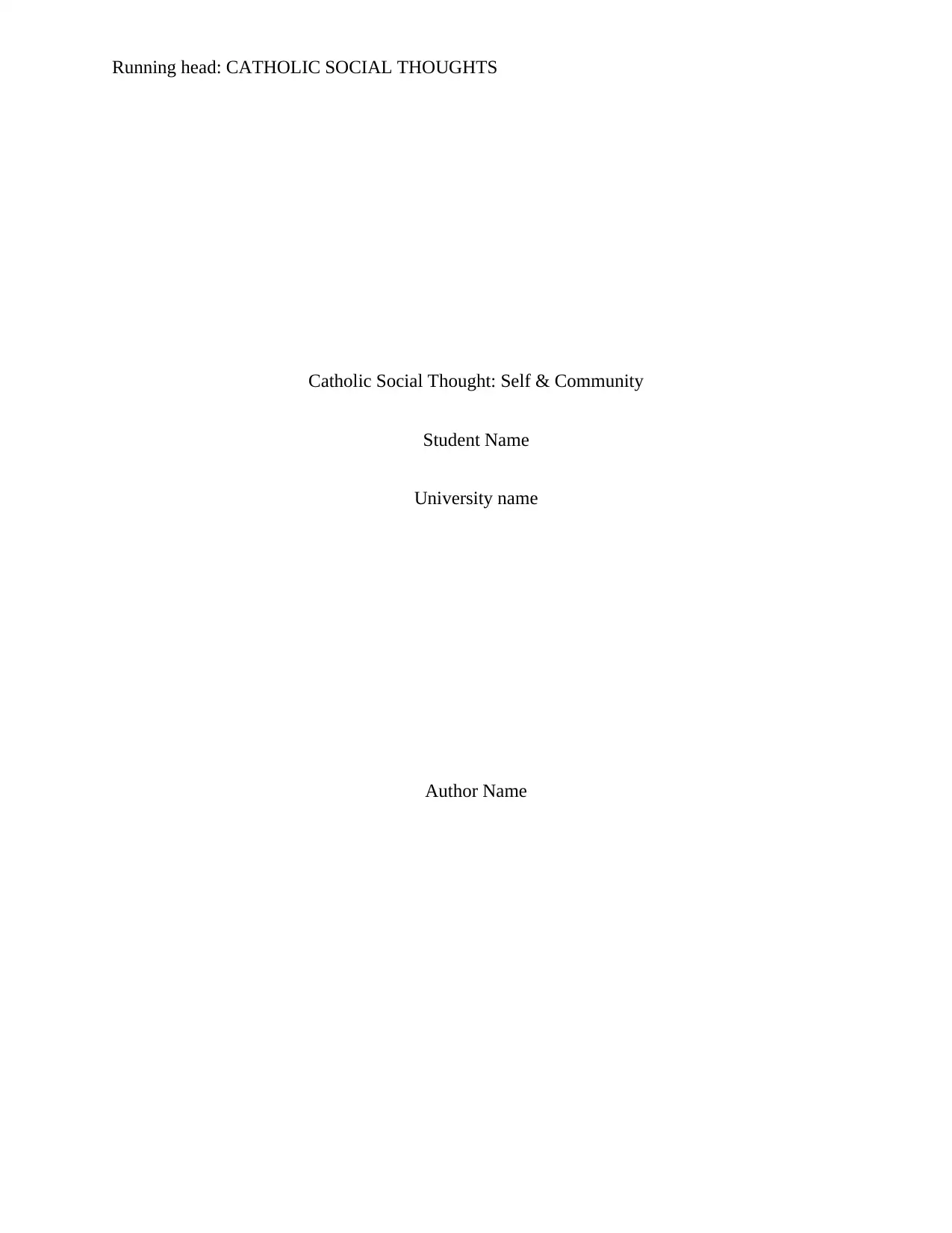
Running head: CATHOLIC SOCIAL THOUGHTS
Catholic Social Thought: Self & Community
Student Name
University name
Author Name
Catholic Social Thought: Self & Community
Student Name
University name
Author Name
Paraphrase This Document
Need a fresh take? Get an instant paraphrase of this document with our AI Paraphraser
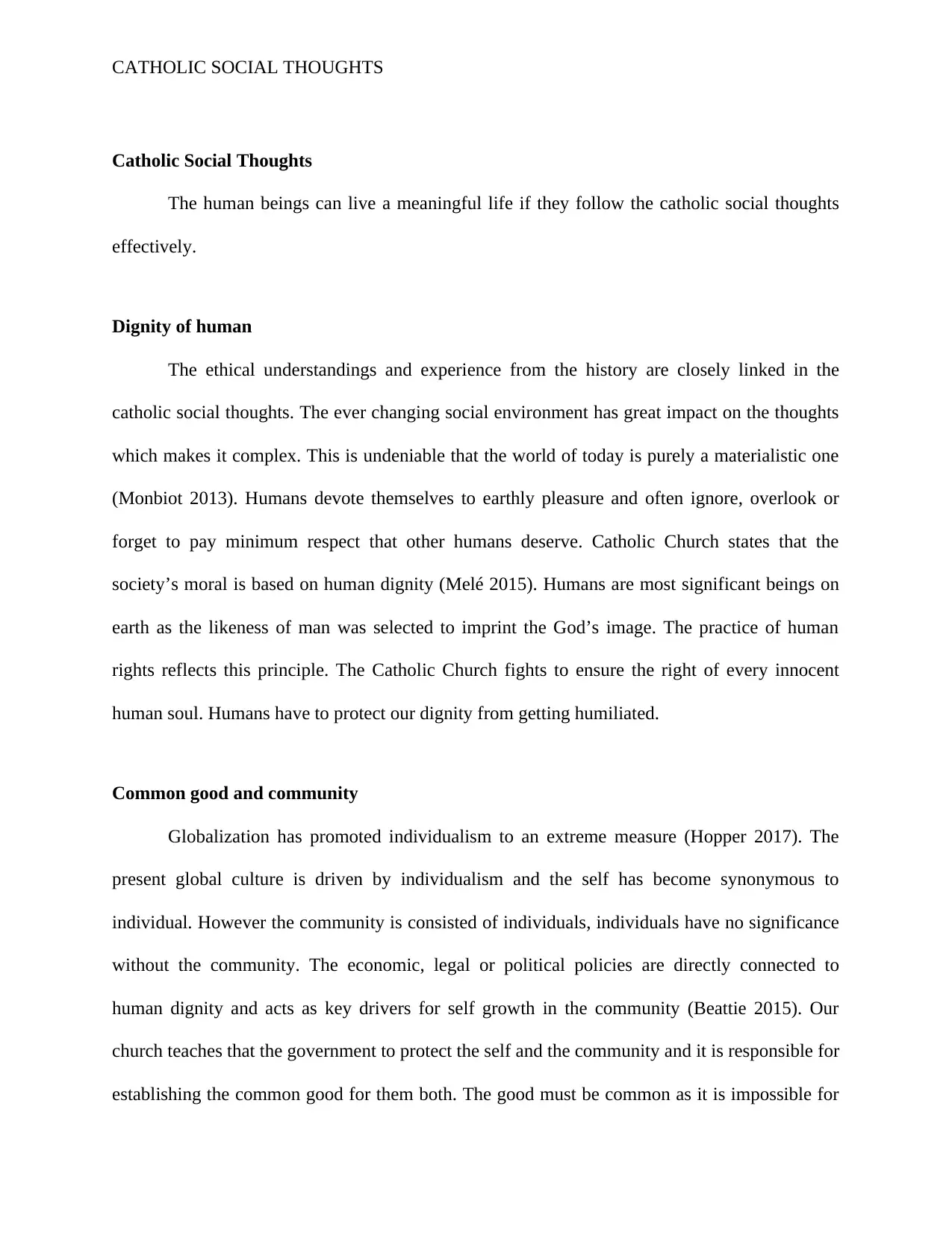
CATHOLIC SOCIAL THOUGHTS
Catholic Social Thoughts
The human beings can live a meaningful life if they follow the catholic social thoughts
effectively.
Dignity of human
The ethical understandings and experience from the history are closely linked in the
catholic social thoughts. The ever changing social environment has great impact on the thoughts
which makes it complex. This is undeniable that the world of today is purely a materialistic one
(Monbiot 2013). Humans devote themselves to earthly pleasure and often ignore, overlook or
forget to pay minimum respect that other humans deserve. Catholic Church states that the
society’s moral is based on human dignity (Melé 2015). Humans are most significant beings on
earth as the likeness of man was selected to imprint the God’s image. The practice of human
rights reflects this principle. The Catholic Church fights to ensure the right of every innocent
human soul. Humans have to protect our dignity from getting humiliated.
Common good and community
Globalization has promoted individualism to an extreme measure (Hopper 2017). The
present global culture is driven by individualism and the self has become synonymous to
individual. However the community is consisted of individuals, individuals have no significance
without the community. The economic, legal or political policies are directly connected to
human dignity and acts as key drivers for self growth in the community (Beattie 2015). Our
church teaches that the government to protect the self and the community and it is responsible for
establishing the common good for them both. The good must be common as it is impossible for
Catholic Social Thoughts
The human beings can live a meaningful life if they follow the catholic social thoughts
effectively.
Dignity of human
The ethical understandings and experience from the history are closely linked in the
catholic social thoughts. The ever changing social environment has great impact on the thoughts
which makes it complex. This is undeniable that the world of today is purely a materialistic one
(Monbiot 2013). Humans devote themselves to earthly pleasure and often ignore, overlook or
forget to pay minimum respect that other humans deserve. Catholic Church states that the
society’s moral is based on human dignity (Melé 2015). Humans are most significant beings on
earth as the likeness of man was selected to imprint the God’s image. The practice of human
rights reflects this principle. The Catholic Church fights to ensure the right of every innocent
human soul. Humans have to protect our dignity from getting humiliated.
Common good and community
Globalization has promoted individualism to an extreme measure (Hopper 2017). The
present global culture is driven by individualism and the self has become synonymous to
individual. However the community is consisted of individuals, individuals have no significance
without the community. The economic, legal or political policies are directly connected to
human dignity and acts as key drivers for self growth in the community (Beattie 2015). Our
church teaches that the government to protect the self and the community and it is responsible for
establishing the common good for them both. The good must be common as it is impossible for
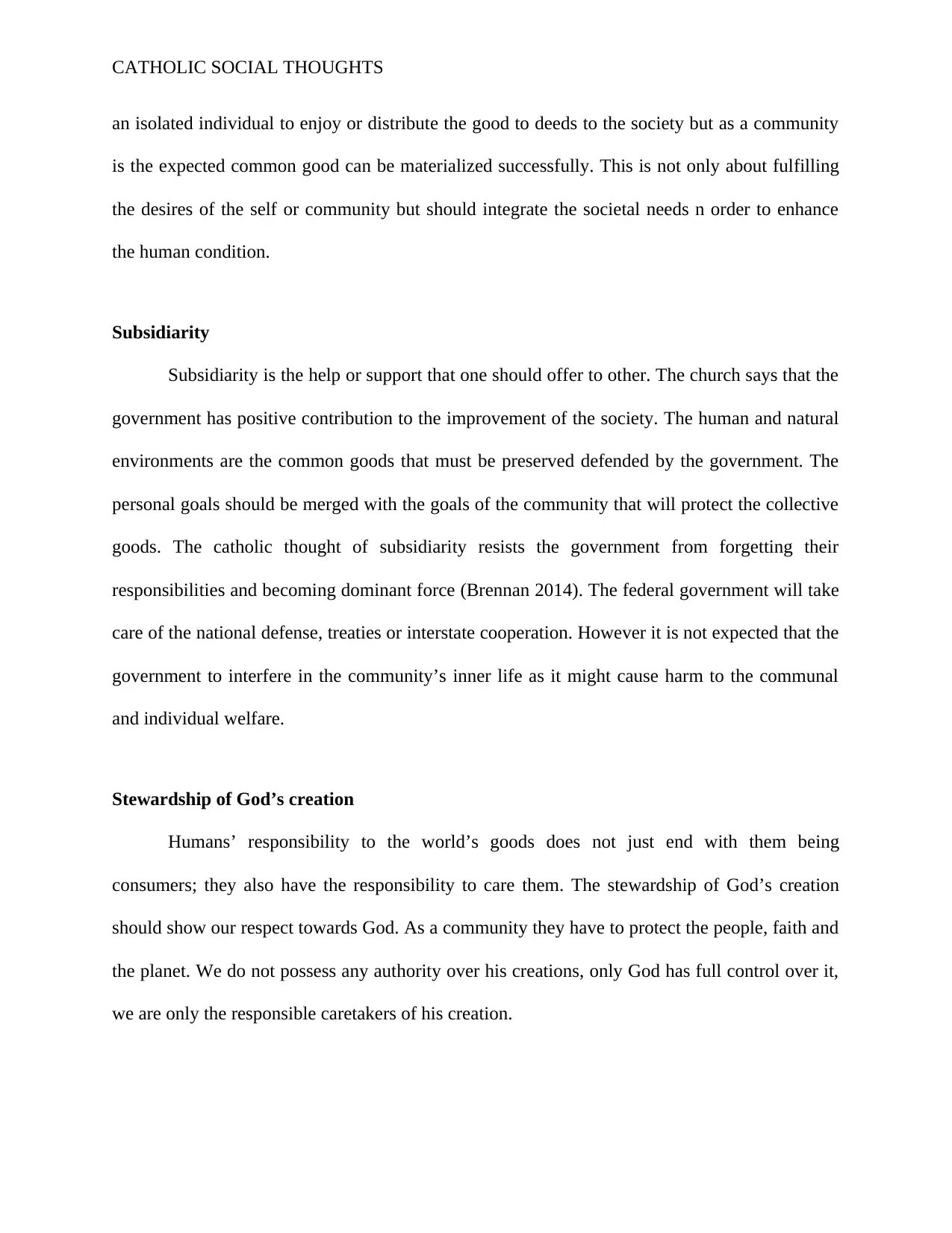
CATHOLIC SOCIAL THOUGHTS
an isolated individual to enjoy or distribute the good to deeds to the society but as a community
is the expected common good can be materialized successfully. This is not only about fulfilling
the desires of the self or community but should integrate the societal needs n order to enhance
the human condition.
Subsidiarity
Subsidiarity is the help or support that one should offer to other. The church says that the
government has positive contribution to the improvement of the society. The human and natural
environments are the common goods that must be preserved defended by the government. The
personal goals should be merged with the goals of the community that will protect the collective
goods. The catholic thought of subsidiarity resists the government from forgetting their
responsibilities and becoming dominant force (Brennan 2014). The federal government will take
care of the national defense, treaties or interstate cooperation. However it is not expected that the
government to interfere in the community’s inner life as it might cause harm to the communal
and individual welfare.
Stewardship of God’s creation
Humans’ responsibility to the world’s goods does not just end with them being
consumers; they also have the responsibility to care them. The stewardship of God’s creation
should show our respect towards God. As a community they have to protect the people, faith and
the planet. We do not possess any authority over his creations, only God has full control over it,
we are only the responsible caretakers of his creation.
an isolated individual to enjoy or distribute the good to deeds to the society but as a community
is the expected common good can be materialized successfully. This is not only about fulfilling
the desires of the self or community but should integrate the societal needs n order to enhance
the human condition.
Subsidiarity
Subsidiarity is the help or support that one should offer to other. The church says that the
government has positive contribution to the improvement of the society. The human and natural
environments are the common goods that must be preserved defended by the government. The
personal goals should be merged with the goals of the community that will protect the collective
goods. The catholic thought of subsidiarity resists the government from forgetting their
responsibilities and becoming dominant force (Brennan 2014). The federal government will take
care of the national defense, treaties or interstate cooperation. However it is not expected that the
government to interfere in the community’s inner life as it might cause harm to the communal
and individual welfare.
Stewardship of God’s creation
Humans’ responsibility to the world’s goods does not just end with them being
consumers; they also have the responsibility to care them. The stewardship of God’s creation
should show our respect towards God. As a community they have to protect the people, faith and
the planet. We do not possess any authority over his creations, only God has full control over it,
we are only the responsible caretakers of his creation.
⊘ This is a preview!⊘
Do you want full access?
Subscribe today to unlock all pages.

Trusted by 1+ million students worldwide
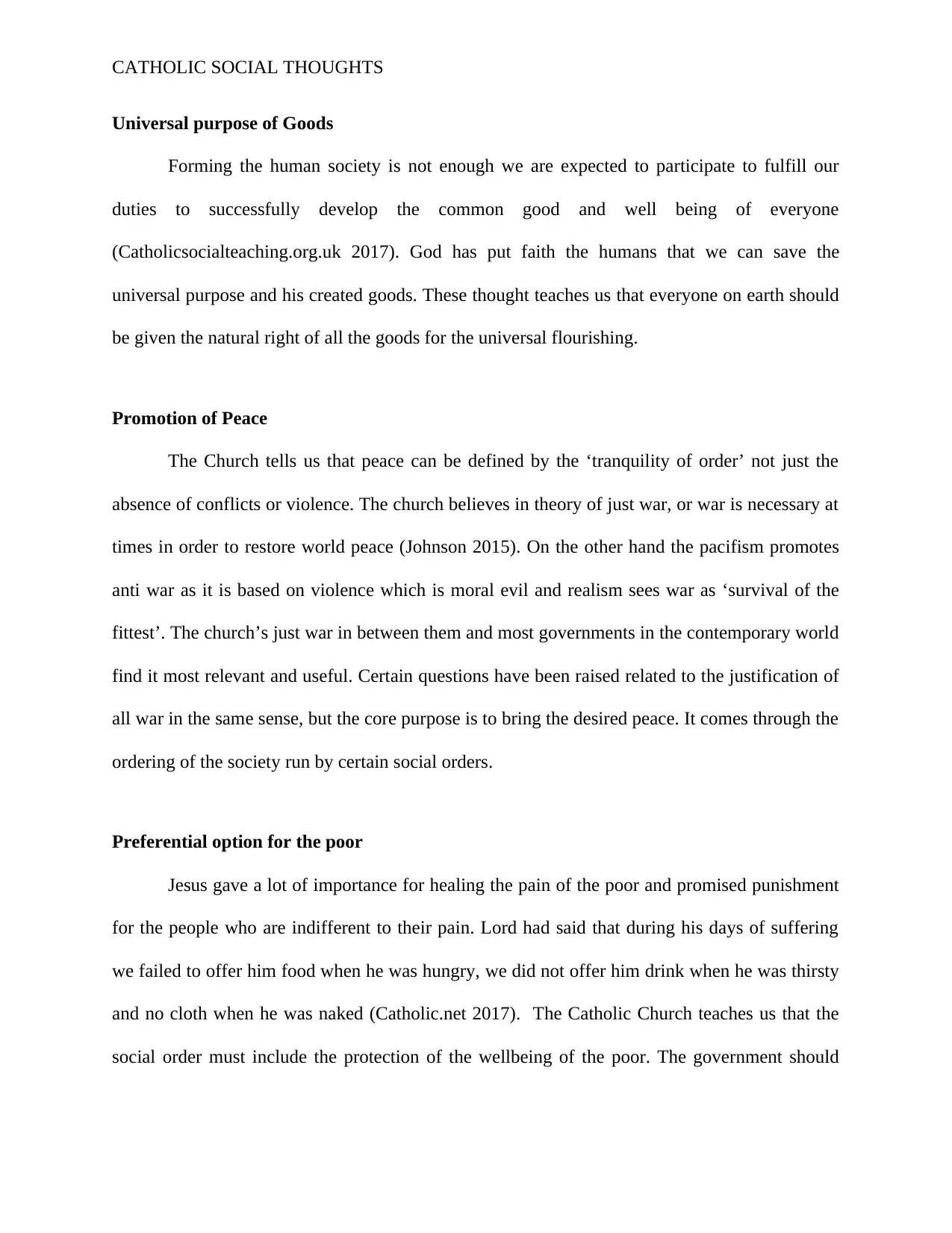
CATHOLIC SOCIAL THOUGHTS
Universal purpose of Goods
Forming the human society is not enough we are expected to participate to fulfill our
duties to successfully develop the common good and well being of everyone
(Catholicsocialteaching.org.uk 2017). God has put faith the humans that we can save the
universal purpose and his created goods. These thought teaches us that everyone on earth should
be given the natural right of all the goods for the universal flourishing.
Promotion of Peace
The Church tells us that peace can be defined by the ‘tranquility of order’ not just the
absence of conflicts or violence. The church believes in theory of just war, or war is necessary at
times in order to restore world peace (Johnson 2015). On the other hand the pacifism promotes
anti war as it is based on violence which is moral evil and realism sees war as ‘survival of the
fittest’. The church’s just war in between them and most governments in the contemporary world
find it most relevant and useful. Certain questions have been raised related to the justification of
all war in the same sense, but the core purpose is to bring the desired peace. It comes through the
ordering of the society run by certain social orders.
Preferential option for the poor
Jesus gave a lot of importance for healing the pain of the poor and promised punishment
for the people who are indifferent to their pain. Lord had said that during his days of suffering
we failed to offer him food when he was hungry, we did not offer him drink when he was thirsty
and no cloth when he was naked (Catholic.net 2017). The Catholic Church teaches us that the
social order must include the protection of the wellbeing of the poor. The government should
Universal purpose of Goods
Forming the human society is not enough we are expected to participate to fulfill our
duties to successfully develop the common good and well being of everyone
(Catholicsocialteaching.org.uk 2017). God has put faith the humans that we can save the
universal purpose and his created goods. These thought teaches us that everyone on earth should
be given the natural right of all the goods for the universal flourishing.
Promotion of Peace
The Church tells us that peace can be defined by the ‘tranquility of order’ not just the
absence of conflicts or violence. The church believes in theory of just war, or war is necessary at
times in order to restore world peace (Johnson 2015). On the other hand the pacifism promotes
anti war as it is based on violence which is moral evil and realism sees war as ‘survival of the
fittest’. The church’s just war in between them and most governments in the contemporary world
find it most relevant and useful. Certain questions have been raised related to the justification of
all war in the same sense, but the core purpose is to bring the desired peace. It comes through the
ordering of the society run by certain social orders.
Preferential option for the poor
Jesus gave a lot of importance for healing the pain of the poor and promised punishment
for the people who are indifferent to their pain. Lord had said that during his days of suffering
we failed to offer him food when he was hungry, we did not offer him drink when he was thirsty
and no cloth when he was naked (Catholic.net 2017). The Catholic Church teaches us that the
social order must include the protection of the wellbeing of the poor. The government should
Paraphrase This Document
Need a fresh take? Get an instant paraphrase of this document with our AI Paraphraser
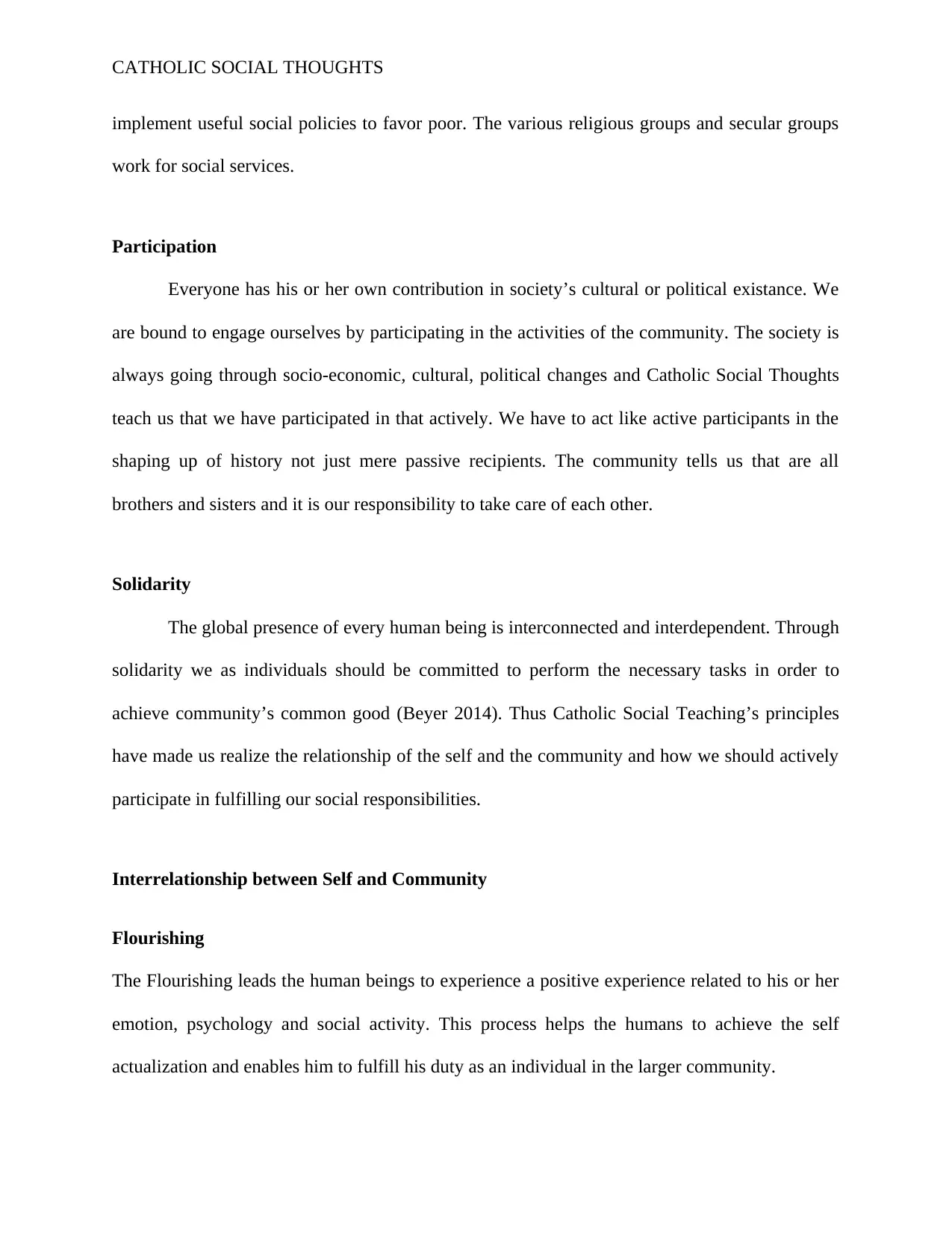
CATHOLIC SOCIAL THOUGHTS
implement useful social policies to favor poor. The various religious groups and secular groups
work for social services.
Participation
Everyone has his or her own contribution in society’s cultural or political existance. We
are bound to engage ourselves by participating in the activities of the community. The society is
always going through socio-economic, cultural, political changes and Catholic Social Thoughts
teach us that we have participated in that actively. We have to act like active participants in the
shaping up of history not just mere passive recipients. The community tells us that are all
brothers and sisters and it is our responsibility to take care of each other.
Solidarity
The global presence of every human being is interconnected and interdependent. Through
solidarity we as individuals should be committed to perform the necessary tasks in order to
achieve community’s common good (Beyer 2014). Thus Catholic Social Teaching’s principles
have made us realize the relationship of the self and the community and how we should actively
participate in fulfilling our social responsibilities.
Interrelationship between Self and Community
Flourishing
The Flourishing leads the human beings to experience a positive experience related to his or her
emotion, psychology and social activity. This process helps the humans to achieve the self
actualization and enables him to fulfill his duty as an individual in the larger community.
implement useful social policies to favor poor. The various religious groups and secular groups
work for social services.
Participation
Everyone has his or her own contribution in society’s cultural or political existance. We
are bound to engage ourselves by participating in the activities of the community. The society is
always going through socio-economic, cultural, political changes and Catholic Social Thoughts
teach us that we have participated in that actively. We have to act like active participants in the
shaping up of history not just mere passive recipients. The community tells us that are all
brothers and sisters and it is our responsibility to take care of each other.
Solidarity
The global presence of every human being is interconnected and interdependent. Through
solidarity we as individuals should be committed to perform the necessary tasks in order to
achieve community’s common good (Beyer 2014). Thus Catholic Social Teaching’s principles
have made us realize the relationship of the self and the community and how we should actively
participate in fulfilling our social responsibilities.
Interrelationship between Self and Community
Flourishing
The Flourishing leads the human beings to experience a positive experience related to his or her
emotion, psychology and social activity. This process helps the humans to achieve the self
actualization and enables him to fulfill his duty as an individual in the larger community.
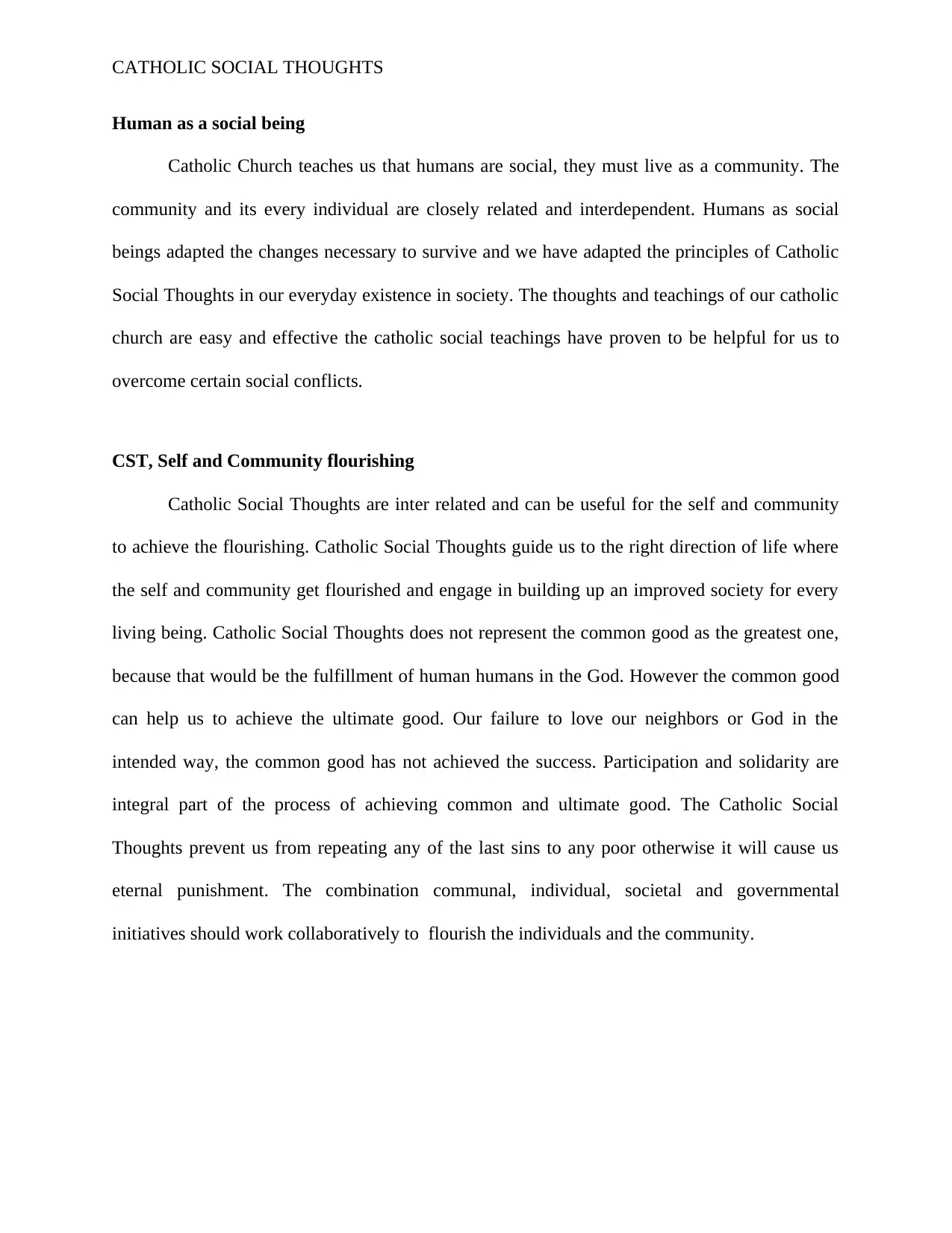
CATHOLIC SOCIAL THOUGHTS
Human as a social being
Catholic Church teaches us that humans are social, they must live as a community. The
community and its every individual are closely related and interdependent. Humans as social
beings adapted the changes necessary to survive and we have adapted the principles of Catholic
Social Thoughts in our everyday existence in society. The thoughts and teachings of our catholic
church are easy and effective the catholic social teachings have proven to be helpful for us to
overcome certain social conflicts.
CST, Self and Community flourishing
Catholic Social Thoughts are inter related and can be useful for the self and community
to achieve the flourishing. Catholic Social Thoughts guide us to the right direction of life where
the self and community get flourished and engage in building up an improved society for every
living being. Catholic Social Thoughts does not represent the common good as the greatest one,
because that would be the fulfillment of human humans in the God. However the common good
can help us to achieve the ultimate good. Our failure to love our neighbors or God in the
intended way, the common good has not achieved the success. Participation and solidarity are
integral part of the process of achieving common and ultimate good. The Catholic Social
Thoughts prevent us from repeating any of the last sins to any poor otherwise it will cause us
eternal punishment. The combination communal, individual, societal and governmental
initiatives should work collaboratively to flourish the individuals and the community.
Human as a social being
Catholic Church teaches us that humans are social, they must live as a community. The
community and its every individual are closely related and interdependent. Humans as social
beings adapted the changes necessary to survive and we have adapted the principles of Catholic
Social Thoughts in our everyday existence in society. The thoughts and teachings of our catholic
church are easy and effective the catholic social teachings have proven to be helpful for us to
overcome certain social conflicts.
CST, Self and Community flourishing
Catholic Social Thoughts are inter related and can be useful for the self and community
to achieve the flourishing. Catholic Social Thoughts guide us to the right direction of life where
the self and community get flourished and engage in building up an improved society for every
living being. Catholic Social Thoughts does not represent the common good as the greatest one,
because that would be the fulfillment of human humans in the God. However the common good
can help us to achieve the ultimate good. Our failure to love our neighbors or God in the
intended way, the common good has not achieved the success. Participation and solidarity are
integral part of the process of achieving common and ultimate good. The Catholic Social
Thoughts prevent us from repeating any of the last sins to any poor otherwise it will cause us
eternal punishment. The combination communal, individual, societal and governmental
initiatives should work collaboratively to flourish the individuals and the community.
⊘ This is a preview!⊘
Do you want full access?
Subscribe today to unlock all pages.

Trusted by 1+ million students worldwide
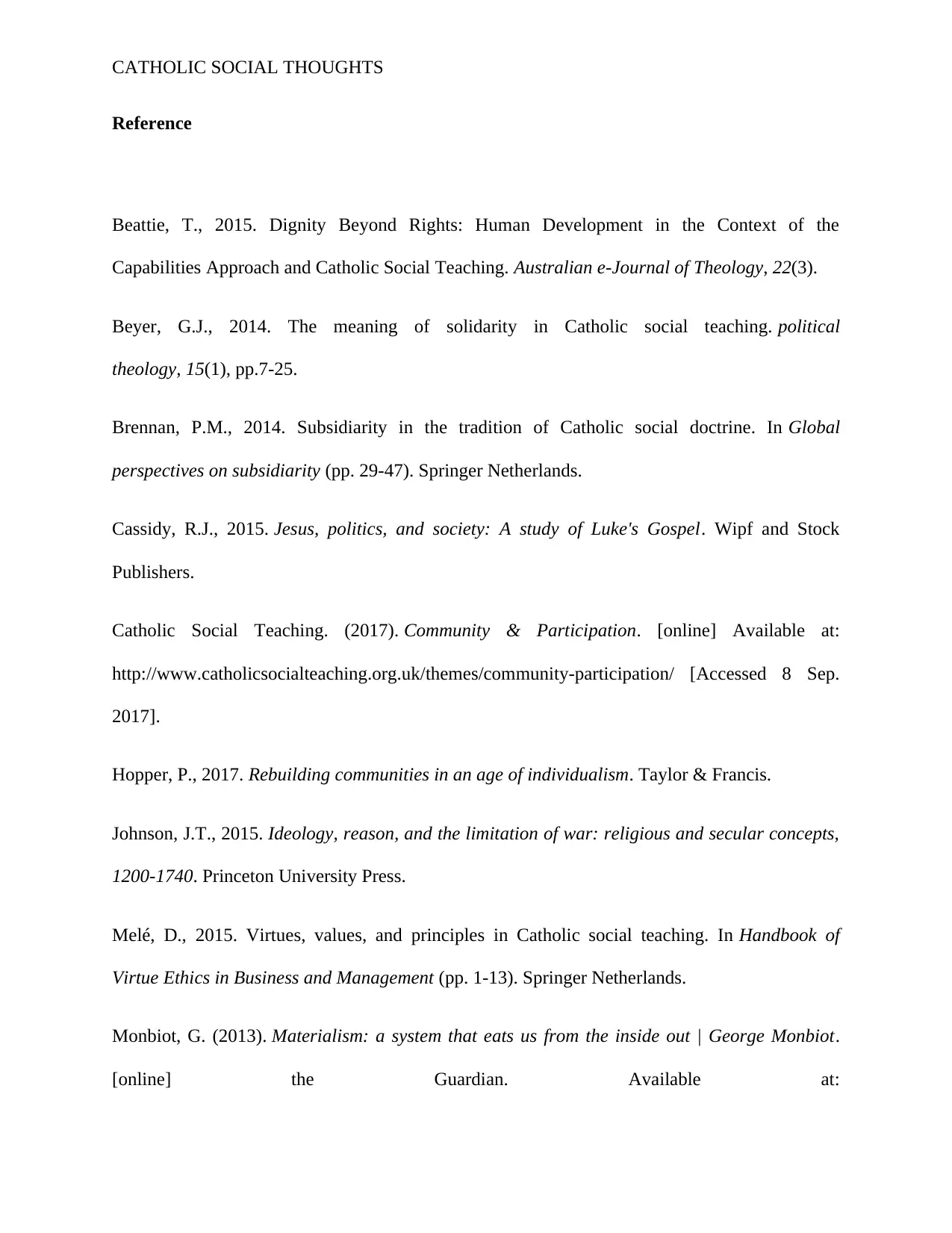
CATHOLIC SOCIAL THOUGHTS
Reference
Beattie, T., 2015. Dignity Beyond Rights: Human Development in the Context of the
Capabilities Approach and Catholic Social Teaching. Australian e-Journal of Theology, 22(3).
Beyer, G.J., 2014. The meaning of solidarity in Catholic social teaching. political
theology, 15(1), pp.7-25.
Brennan, P.M., 2014. Subsidiarity in the tradition of Catholic social doctrine. In Global
perspectives on subsidiarity (pp. 29-47). Springer Netherlands.
Cassidy, R.J., 2015. Jesus, politics, and society: A study of Luke's Gospel. Wipf and Stock
Publishers.
Catholic Social Teaching. (2017). Community & Participation. [online] Available at:
http://www.catholicsocialteaching.org.uk/themes/community-participation/ [Accessed 8 Sep.
2017].
Hopper, P., 2017. Rebuilding communities in an age of individualism. Taylor & Francis.
Johnson, J.T., 2015. Ideology, reason, and the limitation of war: religious and secular concepts,
1200-1740. Princeton University Press.
Melé, D., 2015. Virtues, values, and principles in Catholic social teaching. In Handbook of
Virtue Ethics in Business and Management (pp. 1-13). Springer Netherlands.
Monbiot, G. (2013). Materialism: a system that eats us from the inside out | George Monbiot.
[online] the Guardian. Available at:
Reference
Beattie, T., 2015. Dignity Beyond Rights: Human Development in the Context of the
Capabilities Approach and Catholic Social Teaching. Australian e-Journal of Theology, 22(3).
Beyer, G.J., 2014. The meaning of solidarity in Catholic social teaching. political
theology, 15(1), pp.7-25.
Brennan, P.M., 2014. Subsidiarity in the tradition of Catholic social doctrine. In Global
perspectives on subsidiarity (pp. 29-47). Springer Netherlands.
Cassidy, R.J., 2015. Jesus, politics, and society: A study of Luke's Gospel. Wipf and Stock
Publishers.
Catholic Social Teaching. (2017). Community & Participation. [online] Available at:
http://www.catholicsocialteaching.org.uk/themes/community-participation/ [Accessed 8 Sep.
2017].
Hopper, P., 2017. Rebuilding communities in an age of individualism. Taylor & Francis.
Johnson, J.T., 2015. Ideology, reason, and the limitation of war: religious and secular concepts,
1200-1740. Princeton University Press.
Melé, D., 2015. Virtues, values, and principles in Catholic social teaching. In Handbook of
Virtue Ethics in Business and Management (pp. 1-13). Springer Netherlands.
Monbiot, G. (2013). Materialism: a system that eats us from the inside out | George Monbiot.
[online] the Guardian. Available at:
Paraphrase This Document
Need a fresh take? Get an instant paraphrase of this document with our AI Paraphraser

CATHOLIC SOCIAL THOUGHTS
https://www.theguardian.com/commentisfree/2013/dec/09/materialism-system-eats-us-from-
inside-out [Accessed 8 Sep. 2017].
https://www.theguardian.com/commentisfree/2013/dec/09/materialism-system-eats-us-from-
inside-out [Accessed 8 Sep. 2017].
1 out of 8
Related Documents
Your All-in-One AI-Powered Toolkit for Academic Success.
+13062052269
info@desklib.com
Available 24*7 on WhatsApp / Email
![[object Object]](/_next/static/media/star-bottom.7253800d.svg)
Unlock your academic potential
Copyright © 2020–2026 A2Z Services. All Rights Reserved. Developed and managed by ZUCOL.




